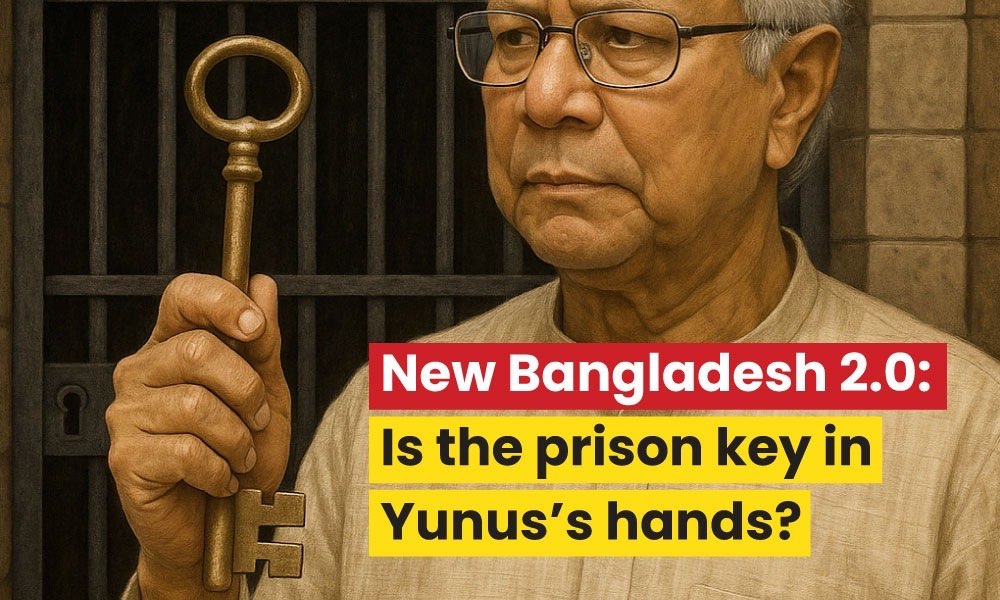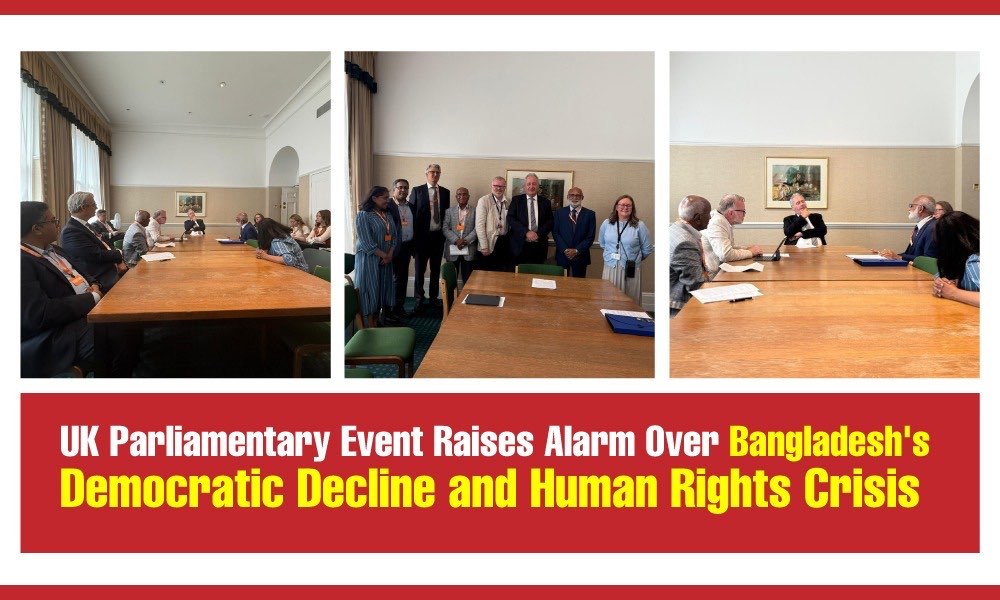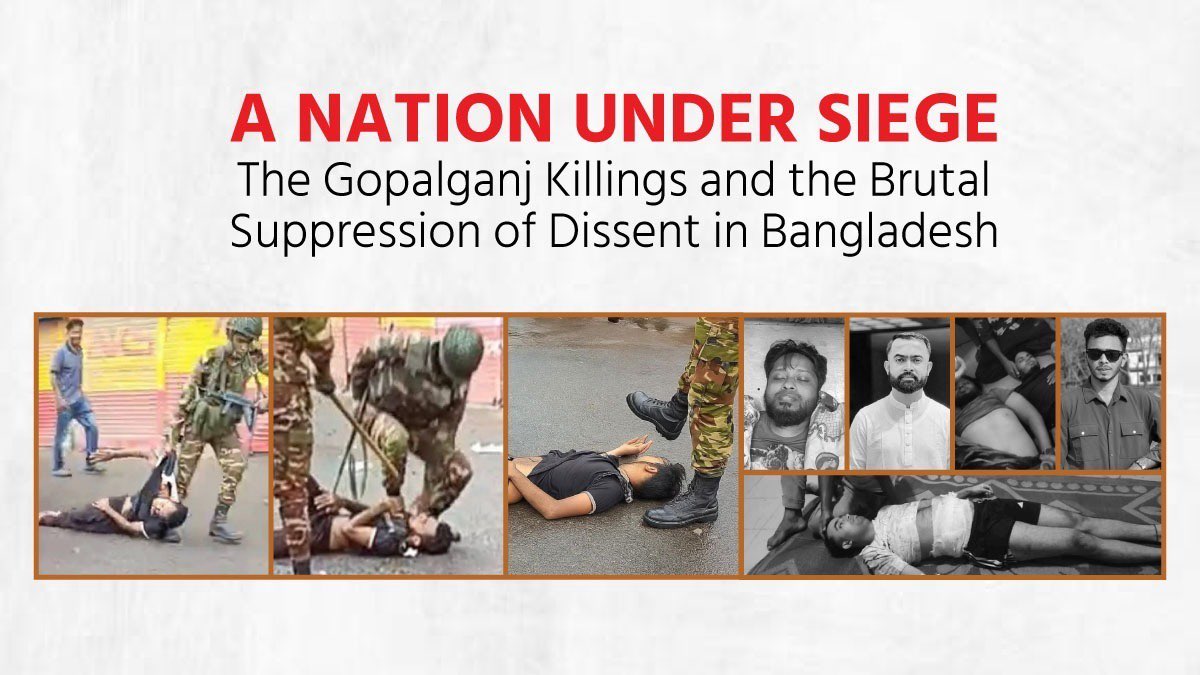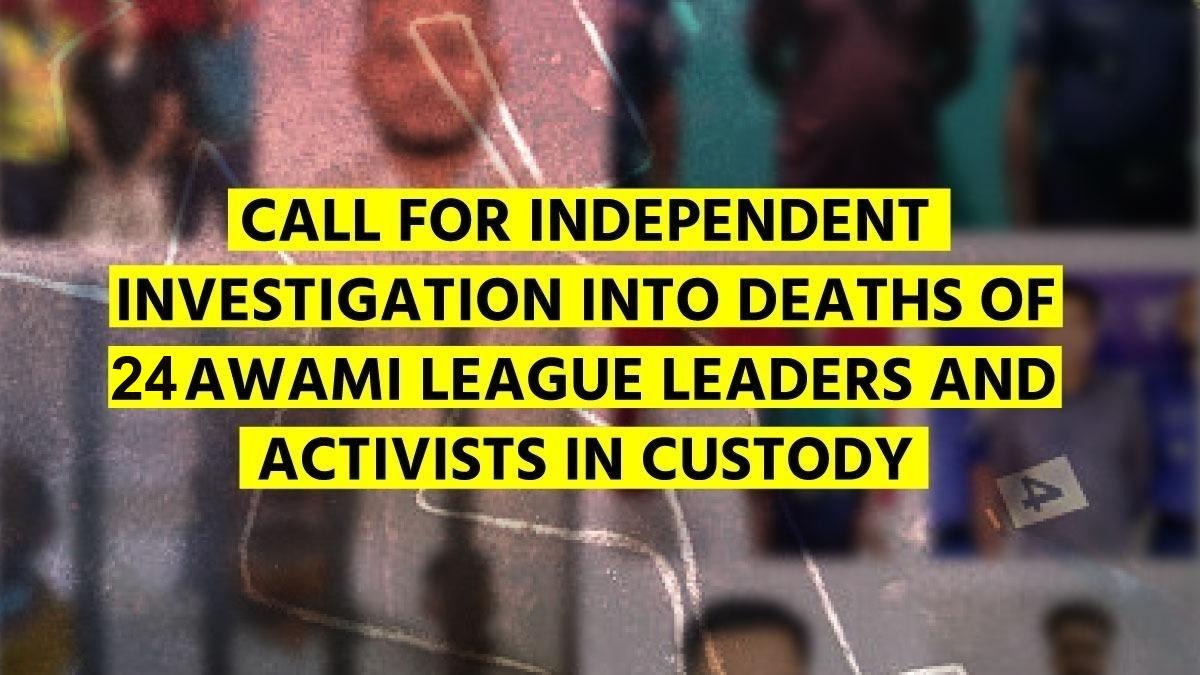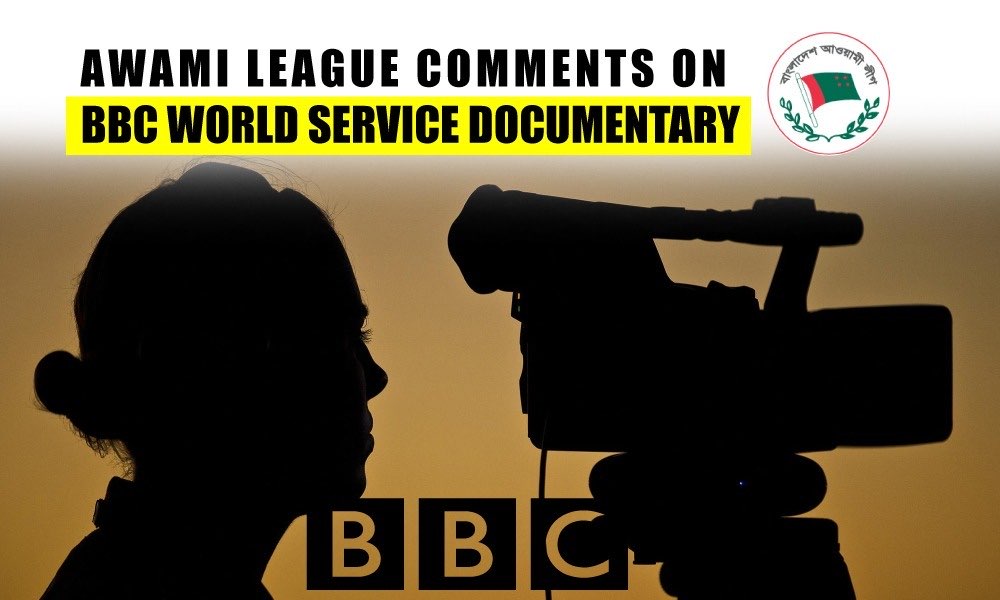2029
Published on August 1, 2025After the fall of the long-standing government led by Sheikh Hasina, the arrival of the interim government in Bangladesh was welcomed by many. Citizens hoped for political reform, restoration of democratic institutions, and an inclusive governance structure. However, the reality reveals a stark contrast between expectation and execution.
Since the interim government took office, Bangladesh has experienced a suffocating political, social, and cultural climate—marked by shrinking press freedom, a lack of judicial independence, disorder and corruption in education, one-sided behavior from law enforcement, and abuse of power by so-called student leaders.
The economy has stagnated, cultural spaces—from temples to cinema halls—face existential threats, and a surge in extremism has further muddied the situation.
The cancellation of journalist accreditations, increased control from political parties and the government, and a climate of fear preventing journalists from freely asking questions all indicate that “freedom of the free media” has not yet returned.
The Press Information Department (PID) revoked the accreditation of 167 journalists between October and November 2024. In April, two journalists from separate television channels were fired after asking questions at a press conference hosted by the interim government's cultural adviser. A third journalist was removed from duty pending an investigation.
During a World Press Freedom Day event, New Age editor Nurul Kabir stated:
“If there is a need to formally celebrate World Press Freedom Day globally, that itself is proof that press freedom is under threat. In Bangladesh, press freedom has notably declined. Political parties are the primary obstacles to free media.”
According to Human Rights Watch (HRW), by November, the government had filed murder charges against at least 140 journalists over alleged involvement in the controversial July coup. It also revoked the press accreditation of more than 150 journalists and charged 19 individuals with treason for alleged desecration of the national flag.
Crisis in Education Under Yunus-Led Interim Government
Bangladesh's education system is in crisis at every level under the interim government led by Yunus. Though initiatives such as teacher recruitment, exam restructuring, and the formation of a reform commission were launched, no visible improvements in discipline or quality have occurred. There is a risk of reverting to outdated mechanical education, allegations of student and teacher exploitation, and worsening university governance—all pointing to a future educational collapse unless real reforms are undertaken.
The Awami League government started a tradition in 2010 of distributing textbooks to students on the first day of the year. While not all, some books were delivered on time. This year, 410 million free textbooks were planned for 45 million students across schools, madrasas, and technical institutes. Only 60 million books were delivered on the first day, with the remaining 350 million delayed.
Teacher & Student Resignations:
After the interim government was formed, many teachers—especially those appointed during the Awami League era—were forced to resign under student and public pressure.
Exam Process Chaos:
The cancellation of suspended HSC and equivalent exams amid student protests triggered mixed reactions. Education researchers warn this will harm students’ careers, from university admissions to future employment. They recommend giving students more time and shortening syllabi rather than canceling exams entirely. Special consideration is also advised for students who were critically ill during the protests.
Additionally, 46 top administrative figures from various universities resigned, some amid threats and humiliation. Classes and exams remain suspended in many universities since August. Leadership voids in key institutions like the Directorate of Secondary and Higher Education have led to operational dysfunction.
Corruption and Political Opportunism
As the tenure of the interim government nears its end, the ruling National Citizen Party (NCP) has become increasingly reckless. Amid uncertainty about the political future, the party is embroiled in numerous scandals.
Sources claim that Yunus’s administration has yet to implement key aspects of the “American plan,” and with elections approaching, Yunus is seeking to return to France quickly.
Due to political opposition, the proposed humanitarian corridor has not been implemented, and Islamist groups (excluding Jamaat-e-Islami) have threatened Yunus over his collaboration with the UN human rights office. Meanwhile, the U.S. has maintained tariffs on Bangladesh, despite easing them for other countries.
The NCP, which emerged with calls for moral politics and a citizen uprising, is now mired in controversy—accused of extortion, financial scandals, and opaque funding. During the July march, allegations emerged that party leaders extorted over 5 million taka in some districts, inconsistent with their stated 20 million taka “citizen trust” fund.
Recently, three leaders of the anti-discrimination student movement were arrested for attempting to extort money from a former Awami League MP in Gulshan. Earlier, in June, students in Gaibandha protested the same group’s extortion practices. In May, a district committee member resigned over similar accusations.
Further, an anti-discrimination leader was arrested in Tongi over extortion. Multiple videos showed him demanding 2 million taka from locals.
Corruption in Adviser’s Office:
The Anti-Corruption Commission (ACC) is investigating allegations of a 1 billion-taka lobbying scandal against Moazzem Hossain, former APS to adviser Asif Mahmud Sajib Bhuiyan. Another 1.5 billion-taka embezzlement case has been raised against Atik Morshed, PA to former information adviser Nahid Islam.
All of this shows how a so-called “anti-discrimination” movement has morphed into a power-driven exercise in political and financial exploitation—deeply harming genuine activism, students, and the general public.
A Crumbling Economy
This fiscal year, Bangladesh's economy has plunged into deep crisis. Analysts blame inconsistent financial policies and political instability under the interim government for aggravating the situation.
The World Bank’s Global Economic Prospects – January 2025 projected Bangladesh’s GDP growth at only 4.1%, compared to 6–7% in the previous year. Investment and industrial production slowed due to mid-2024 political unrest and economic uncertainty. Inflation reached 10.34%, eroding purchasing power and shrinking private consumption.
Garment Sector Layoffs
Prothom Alo reported that 95 garment factories closed in Gazipur, Savar, Narayanganj, and Narsingdi over the past 7 months, leaving around 62,000 workers unemployed. Manab Zamin reported that over 100 factories closed (temporarily or permanently) since last August. While some new factories have opened, entrepreneurs say such closures and openings are part of the normal industrial cycle.
Factory closures are attributed to declining global orders, inflation among international buyers, rising production costs, delayed payments, and political changes.
According to Jugantor, the broader economy faces revenue collection shortfalls, making budget implementation difficult. Public investment in infrastructure and social protection has declined. A weak rural economy has pushed the poor into deeper crisis.
Rise in Extremism, Cultural Attacks
The World Sufi Organization reported a surge in religious extremism and militant activity under the interim government. Over the past six months, 80 shrines and religious sites were attacked or vandalized.
During spring festivals like Pohela Falgun and Valentine’s Day, hardline groups like "Towhidi Janata" disrupted events. Police halted a Ramayana performance in Barisal citing lack of permission, but organizers claimed security threats were the real reason.
In Gangachara, Rangpur, mobs attacked Hindu homes over alleged blasphemy by a teenager.
According to The New York Times, Islamic extremists are regaining ground post-interim government, with renewed attacks on women, minorities, and Ahmadiyyas. Public programs by banned groups like Hizb-ut-Tahrir signal rising militant activity. Despite some law enforcement action, no visible results have emerged.
This surge in extremism poses a dire threat to the country’s social and cultural foundations.
Escalation of Mob Violence
On July 9, a scrap trader named Sohag was beaten to death outside Mitford Hospital. Witnesses said his head was smashed with bricks and stones. On May 13, DU student Shahariar Alam Samyo was stabbed to death in Suhrawardy Udyan. While police arrested suspects, one of their homes was torched by a mob—indicating lawlessness.
According to IGP Baharul Alam, police alone cannot stop mob violence; it requires collective effort. Even 9 months after the coup, police face regular mob attacks—37 in April and 35 in March, mostly spontaneous.
Human Rights Support Society says 119 people were lynched since the interim government took power. In 2023, there were 179 mob deaths—the highest in a decade. Political violence and mob incidents surged after the fall of the Awami League.
There are allegations that mobs were organized with political blessings. DU Professor Towhidul Haque said political protection of criminals undermines law and order.
Foreign nationals, doctors, journalists, and artists have also been attacked. This has led to increased self-censorship in the media.
Kamal Ahmed, head of the Media Reform Commission, said mob threats have instilled fear among journalists. Police adviser Fayez Ahmed acknowledged that enforcement measures haven’t yet brought the situation under control.
Arbitrary Arrests and False Cases
The current scenario suggests widespread arbitrary arrests, detentions without bail, and political persecution—posing a grave challenge to democracy and the rule of law in Bangladesh.
For instance, ENT doctor Hasanul Haque Nipon from PG Hospital was jailed for 55 days over a false case filed by someone in Munshiganj without naming him directly. He claims he was arrested without investigation and the case details were fabricated.
A Kaler Kantho investigation found at least 35 such dubious cases tied to the July–August movement, with many driven by political actors. A syndicate involving rogue police officers, lawyers, and party affiliates is allegedly profiting massively from filing false cases.
In some cases, individuals were falsely declared dead. One man, Selim, discovered a murder case filed using his name as the deceased. He later filed a general diary at the local police station fearing for his life.
HRW has called for an end to “arbitrary arrests and retaliatory violence,” warning that these actions undermine any “important reforms” taken by the interim government.
The group urges reform to eliminate political interference in the police, prosecution, and judiciary, and calls for rapid, safe court hearings for detainees. Laws should be revised to prevent indiscriminate suppression of dissent.
Over the past 10 months, at least 30 Awami League members and affiliates have died in police custody—mostly under fabricated or politically motivated cases.
In summary, the one-year rule of the interim government has plunged Bangladesh into a state of deep uncertainty and unrest—marked by weakened democratic institutions, cultural repression, economic paralysis, and widespread civil rights violations. To recover, the country urgently needs transparency, accountability, and an inclusive democratic framework—otherwise, it risks long-term socio-economic disaster that future generations will bear.
